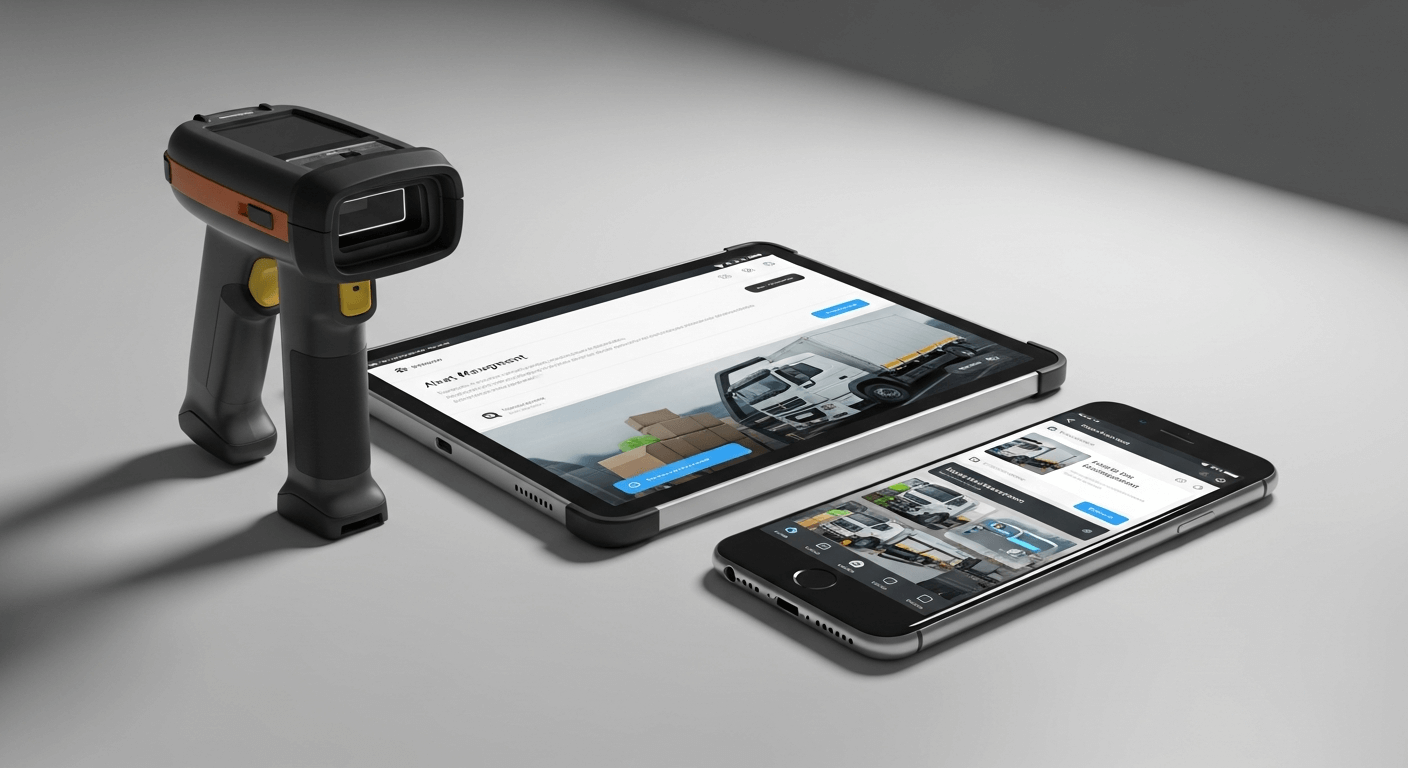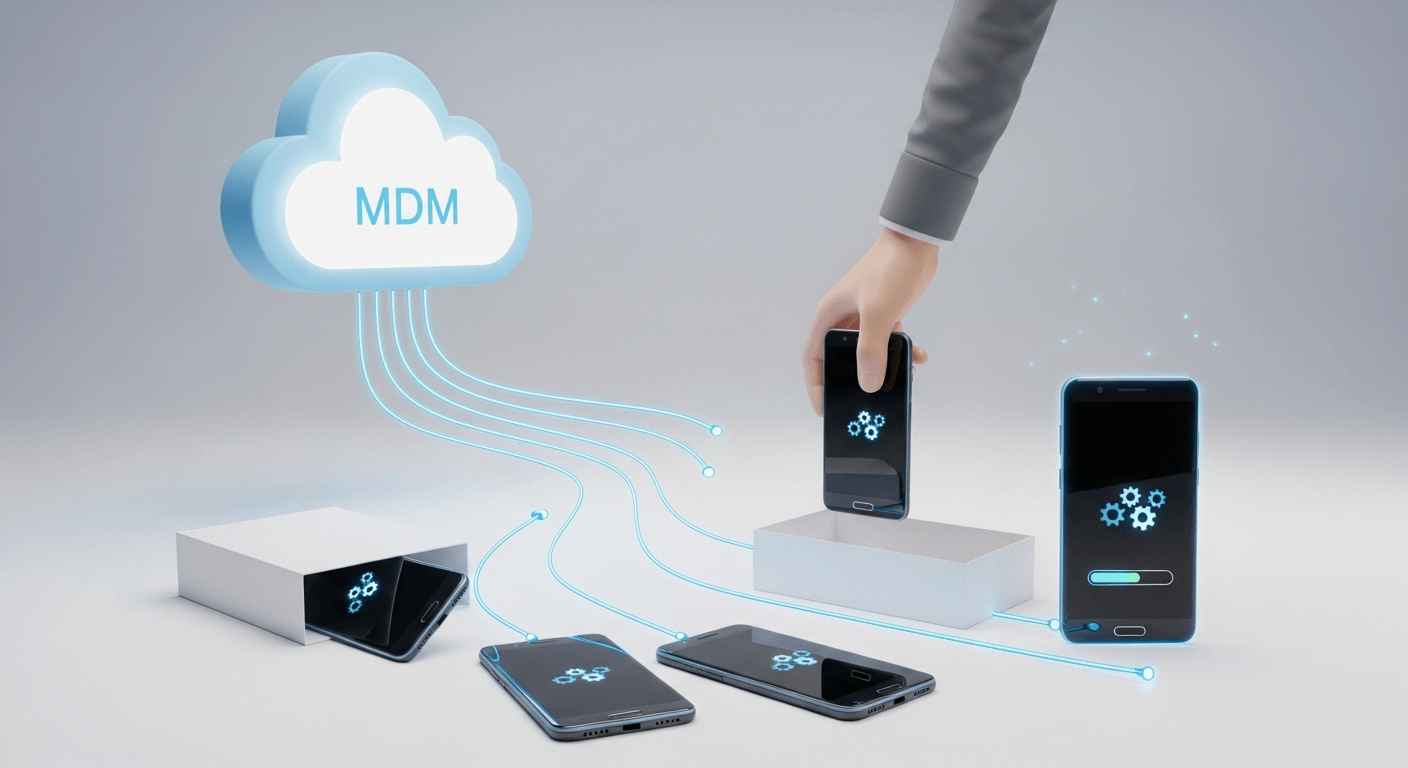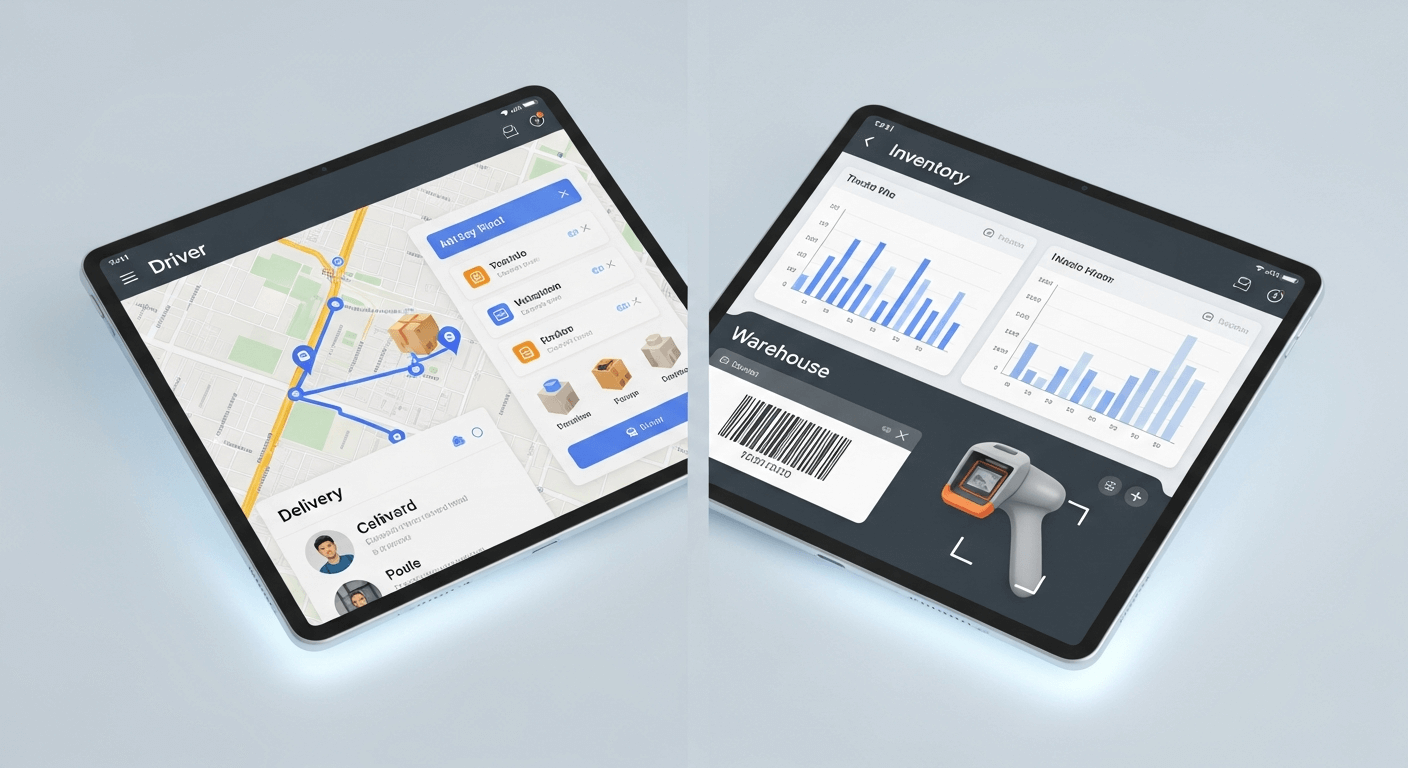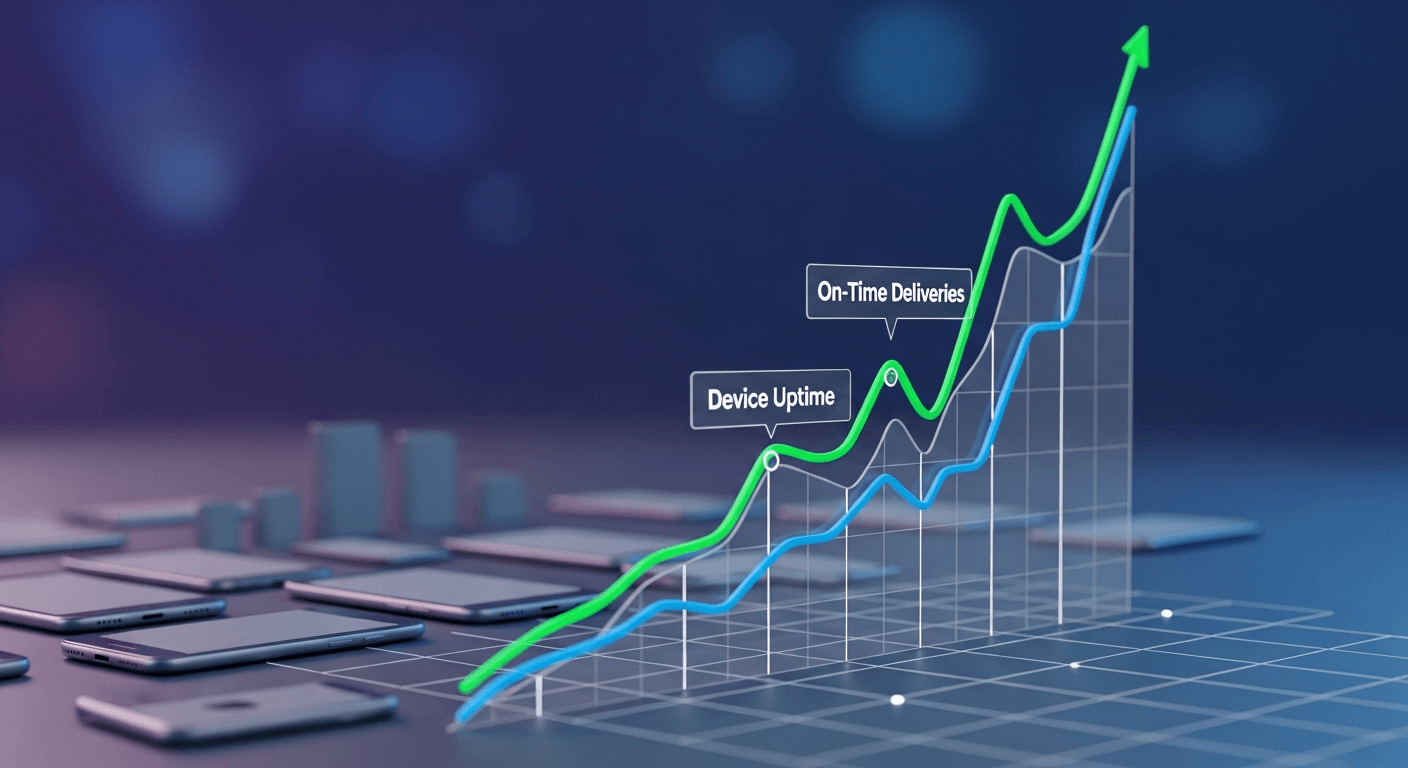Your logistics fleet runs on mobile devices, but managing them is a constant battle against security risks, deployment bottlenecks, and operational downtime. A generic Mobile Device Management (MDM) solution only scratches the surface of these complex challenges. It might help you track a device, but it won't solve the core operational hurdles that impact your bottom line.
This guide cuts through the noise. You will learn how to leverage Android Enterprise's specific capabilities to solve real-world logistics challenges, moving from basic device tracking to full-scale fleet optimization and security. We'll cover deploying devices at scale with Zero-Touch enrollment, creating role-specific kiosk modes for drivers and warehouse staff, securing sensitive data on the move, and minimizing downtime with remote support. This is about making your technology a competitive advantage, not just another asset to manage.
Why Android is the Go-To OS for Modern Logistics Fleets
The logistics and transportation sector has overwhelmingly standardized on Android, and for good reason. The platform's inherent flexibility and diverse hardware ecosystem provide the foundation needed to build a resilient and efficient mobile operation. Unlike closed ecosystems, Android provides the choice and customization necessary to meet the demanding and varied requirements of the supply chain.
A Diverse Hardware Ecosystem: From Rugged Handhelds to In-Cab Tablets
Logistics isn't a one-size-fits-all environment. The device needed in a sub-zero warehouse is fundamentally different from the tablet mounted in a long-haul truck's cab. Android's open hardware model is its greatest strength here, allowing you to select the perfect tool for every job without being locked into a single manufacturer. This operational advantage is why the global digital logistics market is predicted to reach over $120 billion by 2032.
- Ruggedized Devices: Manufacturers like Zebra, Honeywell, and Samsung (with their rugged Galaxy Tab Active series) build devices specifically for harsh environments. These often feature IP68 water and dust resistance, MIL-STD-810H durability ratings, integrated barcode scanners, and glove-touch capable screens.
- In-Vehicle Terminals: Android powers a wide range of dedicated in-cab tablets and telematics devices designed for constant power, GPS connectivity, and integration with vehicle systems.
- Cost-Effective Smartphones: For roles like local couriers or management, a wide selection of consumer-grade Android smartphones offers a powerful yet affordable option for communication and app access.
An Android-specialized MDM like Nomid understands this diverse ecosystem. It offers deep integrations, such as with Samsung Knox, for managing the unique security and hardware features of rugged Samsung devices, providing granular controls that generic MDMs can't match.

Platform Flexibility for Custom Logistics Applications
Your operation likely relies on proprietary software-a custom proof-of-delivery app, a specialized route optimization tool, or an internal communication platform. Android's open nature is critical for deploying and managing these custom applications (APKs) without the restrictions found in other mobile operating systems. You can develop and push updates to your bespoke apps on your own schedule, ensuring your fleet always has the latest tools to do their jobs efficiently. This level of control is essential for maintaining a competitive edge.
"The flexibility of Android Enterprise enabled us to build solutions aligned to our customer needs with simple, flexible management and security tools."
Nomid's application management allows IT to silently deploy, update, and manage these custom APKs across the entire fleet. You can push a critical app update to thousands of devices simultaneously, ensuring every driver and warehouse worker runs the correct, most secure version without any user interaction required.
Unlocking Fleet Efficiency with Advanced Android Enterprise Policies
Having the right hardware is only half the battle. How you manage, secure, and configure that hardware is what separates a chaotic fleet from a highly efficient one. Android Enterprise provides a powerful framework of policies designed for corporate environments, and a specialized MDM is the key to unlocking their full potential for logistics.
Zero-Touch Enrollment: Deploying Delivery Devices in Minutes, Not Weeks
The traditional method of manually provisioning devices is a massive drain on IT resources and a significant bottleneck to scaling your fleet. For every new device, an IT technician might spend hours unboxing, connecting to Wi-Fi, signing into accounts, downloading apps, and configuring settings. Android Zero-Touch Enrollment eliminates this process entirely. It transforms device deployment into a simple, automated workflow.
- Purchase & Assign: You purchase Android devices from a registered Zero-Touch reseller. In your MDM portal, you pre-assign a configuration profile (containing all apps, settings, and restrictions) to these new devices before they even leave the warehouse.
- Direct Ship: The devices are shipped directly to your drivers or field locations, still in their factory-sealed boxes. No IT intervention is needed.
- Automated Setup: The driver simply powers on the device and connects it to a Wi-Fi or cellular network. The device automatically recognizes it's owned by your organization, enrolls itself into your MDM, and downloads the assigned profile.
Within minutes, the device is fully configured, secured, and ready for work with all necessary apps installed and policies applied. A process that once took half a day per device now takes less than five minutes of the driver's time. As an official Android Enterprise Partner, Nomid's platform is engineered to leverage the full speed of Android Zero-Touch, enabling logistics companies to deploy hundreds of devices in an afternoon and eliminate manual setup entirely.

Role-Based Kiosk Mode: Customizing Devices for Drivers vs. Warehouse Staff
A standard Android device is a distraction machine. A driver doesn't need access to a web browser, social media, or games while on the road. Kiosk Mode, a core feature of Android Enterprise, locks a device down to a specific set of applications, transforming it from a general-purpose tablet into a dedicated work tool. This improves security, reduces data usage, and keeps employees focused on their tasks. The key is creating different kiosk profiles for different roles.
Here’s how you can configure two distinct roles using an MDM for logistics:
| Policy Setting | Delivery Driver Profile | Warehouse Manager Profile |
|---|---|---|
| Allowed Apps | Navigation (e.g., Google Maps), Delivery Management App, Secure Messenger, Scanner App | Inventory Management System, Barcode Scanner, Team Communication App, Analytics Dashboard |
| System Restrictions | Status bar hidden, Settings access blocked, Home button disabled, App installation blocked | Settings access limited (Wi-Fi only), Camera access enabled, USB file transfer disabled |
| Connectivity | Wi-Fi and Cellular data enabled, Hotspot functionality disabled | Locked to specific warehouse Wi-Fi SSIDs only, Cellular data disabled |
| Purpose | Minimize distractions on the road, ensure focus on delivery tasks, secure proof-of-delivery data. | Provide access to all necessary warehouse tools, prevent non-work use on the floor, secure inventory data. |
Nomid's intuitive UI makes it simple to create, assign, and modify these complex Kiosk Mode profiles. You can deploy a "Driver" profile to thousands of devices with a few clicks, ensuring every courier has the exact same secure and efficient toolset.

Robust Security Policies: Protecting Proof of Delivery and Customer Data
Every device in your fleet is a potential entry point for a data breach. Securing them goes far beyond a simple passcode. Android Enterprise provides a suite of advanced security controls that are essential for protecting sensitive customer information, delivery manifests, and payment details.
- Mandatory Encryption: Enforce full-disk encryption on every device, ensuring that if a device is lost or stolen, the data stored on it is unreadable.
- Geofencing Policies: Create virtual boundaries around your service areas or distribution centers. You can configure automated alerts if a device leaves a designated zone, or even trigger a remote wipe if it remains outside the area for too long.
- Data Exfiltration Prevention: Disable USB file transfer, screen capture, and copy-paste functions to prevent sensitive data from being moved off the device.
- Forced VPN Connectivity: Mandate that all data traffic from critical logistics apps must pass through your corporate VPN, securing data in transit between the device and your servers.
For fleets using Samsung devices, Nomid's integration with the Samsung Knox platform provides an extra layer of hardware-backed security. This allows for even more granular controls, such as blocking firmware downgrades and verifying device integrity from the chip level up, which is critical for protecting sensitive logistics data.
Remote Control & Support: Fixing Issues on the Road to Minimize Downtime
Downtime is a direct cost in logistics. A driver with a frozen app 200 miles from the depot is a failed delivery waiting to happen. Instead of having that driver attempt a frustrating phone troubleshoot or return to base, a modern MDM gives your IT team remote support capabilities.
With remote view and control, your help desk can see the device's screen in real-time, diagnose the problem, and take control to resolve it in minutes. They can clear an app's cache, restart a service, or correct a setting without the driver needing to do anything. This immediate support keeps your fleet moving and your delivery schedules on track. Fleet studies show that real-time monitoring and data controls can reduce fuel waste and cut labor costs by up to 10%.
Organizations using centralized device management report a 25% reduction in help desk tickets, saving IT teams hundreds of hours annually.
The Nomid platform includes powerful remote control capabilities designed specifically for Android. It allows your IT team to efficiently support your entire mobile workforce, minimizing downtime and ensuring operational continuity no matter where your drivers are.

Case Study: How a Mid-Sized Courier Service Scaled its Fleet by 50%
The benefits of a specialized Android MDM for logistics are not theoretical. They translate into measurable improvements in efficiency, security, and scalability.
The Challenge: Manual Setups, Security Gaps, and High Downtime
A regional courier service was growing rapidly, but its IT processes couldn't keep up. Manually setting up each new driver's tablet took an IT technician over four hours, delaying fleet expansion. Lost devices were a major data breach risk, as they only had a simple passcode for protection. Furthermore, app-related issues on the road frequently caused delivery delays, impacting customer satisfaction and leading to a high volume of support calls.
The Solution and Results: Faster Deployment, Zero Breaches, 99% Uptime
By implementing a specialized Android MDM, the company completely overhauled its mobile operations. They used Zero-Touch Enrollment to deploy 50 new devices in a single afternoon, with zero IT touch. They created a locked-down Kiosk Mode for all drivers, which eliminated device misuse and reduced distracting support calls. When two devices were lost in the first three months, the remote wipe capability ensured no data was compromised. Most importantly, their IT team used remote support to resolve 95% of driver-reported issues in under 10 minutes.
- 90% reduction in device setup time.
- Zero data breaches from lost or stolen devices.
- 25% fewer overall support tickets.
- Measurable improvement in on-time delivery rates and driver productivity.

From Asset Tracking to Operational Excellence
Managing a modern logistics fleet requires moving beyond simple GPS tracking. True success comes from controlling the entire device lifecycle, from deployment to daily use and end-of-life security. A generic MDM can't provide the specialized tools needed for the unique demands of your industry.
- Key Takeaway 1: A specialized Android Enterprise MDM is essential for solving the unique challenges of logistics and transportation.
- Key Takeaway 2: Zero-Touch Enrollment is non-negotiable for scaling your fleet efficiently and reducing the burden on your IT team.
- Key Takeaway 3: Role-based Kiosk Modes and robust security policies are fundamental to driver productivity and protecting sensitive data.
- Key Takeaway 4: Remote support tools directly reduce vehicle downtime, cut costs, and improve delivery success rates.
The next step is to audit your current device management process. Identify your biggest bottleneck-is it deployment, security, or support? Then, seek a partner that specializes in the Android ecosystem to understand how these specific policies can be implemented in your environment.
Nomid MDM is built for Android Enterprise. Our platform provides the specialized tools, intuitive UI, and expert support that logistics companies need to secure and scale their fleets. We solve the challenges discussed in this article, starting with the fastest Zero-Touch enrollment in the industry and providing the deep policy control required to keep your fleet running efficiently and securely.
Written by
David Ponces
Enjoying this article?
Get more insights on mobile device management delivered to your inbox.
Share this article
Tags
Related Articles
View all posts mdm
mdmDecoding the Android XR Platform: What IT Leaders Need to Know
Explore the new Android XR platform for enterprise. Learn about future device management capabilities, security protocols, and industry use cases to prepare your IT strategy.
 mdm
mdmNomid announces partnership with Valstec, a distributor of PICO virtual reality headsets in Brazil
Nomid MDM, a Mobile Device Management software maker, announces a strategic partnership with Valstec, the official distributor of PICO virtual reality headsets in Brazil.
